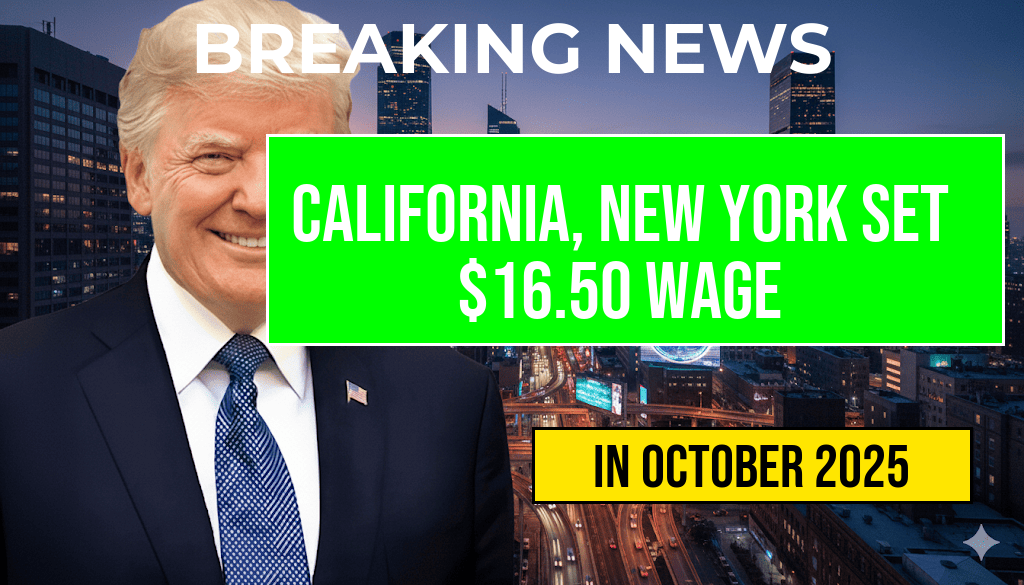California and New York are set to implement a new minimum wage of $16.50 per hour, a significant move aimed at improving the livelihoods of low-income workers in these high-cost states. The change, which will take effect in the coming months, comes as part of ongoing efforts by state lawmakers to address income inequality and ensure that wages keep pace with rising living expenses. Both states have been at the forefront of labor reforms, and this latest adjustment reflects a growing trend among states prioritizing employee welfare. Advocates argue that a higher minimum wage is essential for workers to afford basic necessities, while opponents raise concerns about potential impacts on small businesses and employment rates.
Implementation Timeline and Legislative Background
The new wage will be phased in over the next year, with California and New York officials committing to a timeline that allows businesses to adjust. In California, Governor Gavin Newsom has spearheaded the wage increase following advocacy from labor groups and community organizations. Similarly, New York Governor Kathy Hochul has championed the initiative, citing the need for a living wage in urban areas where housing costs are exorbitant.
Key Dates and Milestones
- California: The wage increase will begin on July 1, 2024.
- New York: The implementation is scheduled for January 1, 2024.
Economic Implications
While the increase in minimum wage aims to benefit workers, it also raises questions regarding its economic implications. Proponents of the wage hike assert that increasing pay will lead to greater consumer spending, which can stimulate local economies. A report from the Forbes Finance Council indicates that higher wages can lead to increased productivity and reduced employee turnover, ultimately benefiting businesses in the long run.
Conversely, critics warn that the new wage could strain small businesses that may struggle to absorb the higher labor costs. Some small business owners have expressed concerns that the wage increase could lead to reduced hiring or even layoffs, particularly in industries with tighter profit margins.
Public Response and Advocacy
The announcement of the minimum wage increase has elicited a range of responses from various stakeholders. Labor unions and worker advocacy groups have celebrated the move as a long-overdue step towards economic justice. “This increase is a crucial victory for workers who have been fighting for fair pay,” said Maria Lopez, a spokesperson for the California Labor Federation. “No one who works full-time should have to live in poverty.”
On the other hand, some business organizations argue that the increase may lead to unintended consequences. The National Federation of Independent Business (NFIB) has raised alarms about the potential for job losses and reduced hours. “We need to ensure that businesses can thrive, or we risk harming the very workers we aim to help,” stated an NFIB representative.
Comparative Analysis with Other States
As California and New York move towards a $16.50 minimum wage, it is essential to examine how this compares to other states. Currently, several states and cities have enacted higher minimum wages, with Seattle, Washington, leading at $17.27 per hour. Below is a table outlining the minimum wage rates in select states.
| State | Minimum Wage |
|---|---|
| California | $16.50 |
| New York | $16.50 |
| Washington | $17.27 |
| Massachusetts | $15.00 |
| Florida | $11.00 |
Next Steps and Future Considerations
As the implementation date approaches, both California and New York will need to monitor the effects of the wage increase closely. Policymakers are expected to evaluate the real-world impacts on employment, business viability, and worker satisfaction. Additionally, discussions surrounding potential future increases or adjustments based on inflation may also arise, reflecting the dynamic nature of labor economics.
For more details on minimum wage laws and their implications, you can visit the Wikipedia page on Minimum Wage.
Frequently Asked Questions
What is the new minimum wage being implemented in California and New York?
The new minimum wage being implemented in both California and New York is $16.50 per hour.
When will the minimum wage increase take effect?
The minimum wage increase is set to take effect on January 1, 2024, in both states.
Who will be affected by the new minimum wage law?
The new minimum wage law will affect all workers in California and New York who are currently earning less than $16.50 per hour.
How does this increase compare to previous minimum wage rates?
The $16.50 minimum wage represents a significant increase from the previous rates of $15.00 per hour in both states.
What are the potential impacts of the minimum wage increase on businesses?
Businesses may experience increased labor costs due to the minimum wage hike, which could lead to adjustments in pricing, staffing, or operational strategies.

Leave a Reply